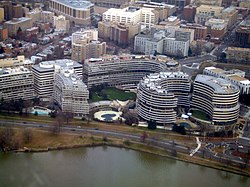
Back فضيحة ووترغيت Arabic فضيحة ووترجيت ARZ Votergeyt qalmaqalı AZ واترقیت روسوالیغی AZB Уотэргейцкі скандал BE Уотъргейт Bulgarian ওয়াটারগেট কেলেঙ্কারি Bengali/Bangla Afera "Watergate" BS Escàndol Watergate Catalan Aféra Watergate Czech
| Watergate scandal |
|---|
 |
| Events |
| People |
| ||
|---|---|---|
|
Pre-vice presidency 36th Vice President of the United States Post-vice presidency 37th President of the United States
Judicial appointments
Policies
First term
Second term
Post-presidency Presidential campaigns Vice presidential campaigns
 |
||
The Watergate scandal was a significant political controversy in the United States during the presidency of Richard Nixon from 1972 to 1974, ultimately resulting in Nixon's resignation. It originated from attempts by the Nixon administration to conceal its involvement in the June 17, 1972, break-in at the Democratic National Committee headquarters located in the Watergate Office Building in Washington, D.C.
Following the apprehension of the five individuals involved in the break-in, both the press and the Department of Justice connected the funds found on those involved to the CRP (the fundraising organization of Richard Nixon's 1972 re-election campaign).[1][2] Subsequent investigations and revelations during trials prompted the U.S. House of Representatives to grant the House Judiciary Committee expanded investigative authority.[3][4] Additionally, the Senate established the U.S. Senate Watergate Committee, which conducted hearings.
Witnesses testified that Nixon had sanctioned plans to cover up his administration's involvement in the burglary and that there was a voice-activated taping system in the Oval Office.[5][6] Nixon's administration resisted the investigations, leading to a constitutional crisis.[7] The televised Senate Watergate hearings garnered nationwide attention and public interest.[8]
Numerous revelations and Nixon's efforts to impede the investigation in 1973 led the House to initiate impeachment proceedings against him.[9][10] The Supreme Court's ruling in United States v. Nixon compelled Nixon to surrender the Oval Office tapes, which revealed his complicity in the cover-up. The House Judiciary Committee approved three articles of impeachment against Nixon,[11] who subsequently resigned from office on August 9, 1974, becoming the only U.S. president to do so. His successor, Gerald Ford, pardoned him on September 8, 1974.
The Watergate scandal resulted in 69 indictments and 48 convictions, involving several high-ranking officials from the Nixon administration.[12] The term "Watergate" has since become synonymous with various clandestine and illicit activities conducted by Nixon's aides, including the bugging of political opponents' offices, unauthorized investigations, and the misuse of government agencies for political purposes.[13] The addition of "-gate" to a term has since been used to denote public scandals,[14][15][16] particularly in politics.[17][18]
- ^ Perry, James M. "Watergate Case Study". Class Syllabus for "Critical Issues in Journalism". Columbia School of Journalism, Columbia University. Archived from the original on July 15, 2019. Retrieved July 27, 2018.
- ^ Dickinson, William B.; Cross, Mercer; Polsky, Barry (1973). Watergate: chronology of a crisis. Vol. 1. Washington, D.C.: Congressional Quarterly Inc. pp. 8, 133, 140, 180, 188. ISBN 0-87187-059-2. OCLC 20974031.
- ^ Rybicki, Elizabeth; Greene, Michael (October 10, 2019). "The Impeachment Process in the House of Representatives". CRS Report for Congress. Washington, D.C.: Congressional Research Service, Library of Congress. pp. 5–7. R45769. Archived from the original on January 22, 2020. Retrieved November 7, 2019.
- ^ "H.Res.74 – 93rd Congress, 1st Session". congress.gov. February 28, 1973. Archived from the original on December 30, 2019. Retrieved October 21, 2019.
- ^ "A burglary turns into a constitutional crisis". CNN. June 16, 2004. Archived from the original on November 26, 2020. Retrieved November 7, 2019.
- ^ "Senate Hearings: Overview". fordlibrarymuseum.gov. Archived from the original on July 2, 2017. Retrieved November 7, 2019.
- ^ "A burglary turns into a constitutional crisis". CNN. June 16, 2004. Archived from the original on November 30, 2020. Retrieved May 13, 2014.
- ^ "'Gavel-to-Gavel': The Watergate Scandal and Public Television". American Archive of Public Broadcasting. Retrieved November 10, 2019.
- ^ "The Smoking Gun Tape" (Transcript of the recording of a meeting between President Nixon and H. R. Haldeman). Watergate.info website. June 23, 1972. Archived from the original on May 1, 2012. Retrieved January 17, 2007.
- ^ White, Theodore Harold (1975). Breach of Faith: The Fall of Richard Nixon. New York: Atheneum Publishers. p. 7. ISBN 0-689-10658-0. OCLC 1370091.
- ^ Manheim, Karl; Solum, Lawrence B. (Spring 1999). "Nixon Articles of Impeachment". Impeachment Seminar. Archived from the original on March 3, 2017.
- ^ Cite error: The named reference
convictionswas invoked but never defined (see the help page). - ^ Ervin, Sam, et al., Final Report of the Watergate Committee.
- ^ Hamilton, Dagmar S. "The Nixon Impeachment and the Abuse of Presidential Power", In Watergate and Afterward: The Legacy of Richard M. Nixon. Leon Friedman and William F. Levantrosser, eds. Santa Barbara, CA: Greenwood Publishing Group, 1992. ISBN 0-313-27781-8
- ^ Smith, Ronald D. and Richter, William Lee. Fascinating People and Astounding Events From American History. Santa Barbara, CA: ABC-CLIO, 1993. ISBN 0-87436-693-3
- ^ Lull, James and Hinerman, Stephen. Media Scandals: Morality and Desire in the Popular Culture Marketplace. New York: Columbia University Press, 1997. ISBN 0-231-11165-7
- ^ Trahair, R.C.S. From Aristotelian to Reaganomics: A Dictionary of Eponyms With Biographies in the Social Sciences. Santa Barbara, CA: Greenwood Publishing Group, 1994. ISBN 0-313-27961-6
- ^ "El 'valijagate' sigue dando disgustos a Cristina Fernández | Internacional". El País. November 4, 2008. Archived from the original on July 2, 2017. Retrieved July 28, 2014.
